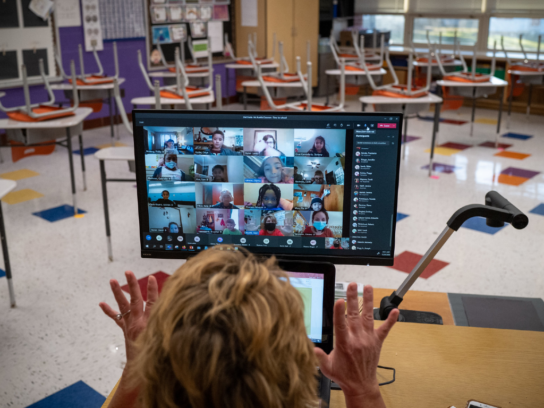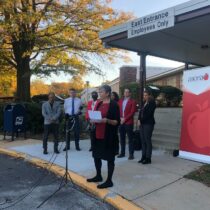
Montgomery County Public School teachers faced significant challenges this year transitioning to in-person learning, and a substitute teacher shortage only added to the fatigue and chaos teachers faced.
“I think it’s just the added uncertainty of COVID-19 over top of an already difficult job,” said Megan Cooley-Klein, who is in her eighth year teaching at MCPS. “The school schedule, our health and our students’ health, students’ prior knowledge — none of that can be taken for granted. And that just compounds the stress.”
Just last week, MCPS contacted former students via email asking the alumni to consider becoming full- or part-time substitute teachers. MCPS reportedly has 161 teaching vacancies.
“It’s very normal to walk into the building and have the secretary tell you that there are a number of teachers absent without substitutes,” Cooley-Klein said. “In the past, this kind of thing only might have happened near the ends of quarters or right before breaks.”
Cooley-Klein noted many substitutes are typically older, and they simply may not be willing to work in a high risk environment during the pandemic. “I don’t know if you’re going to get any subs in that situation coming back until the pandemic is no longer a health risk in this area.”
At Quince Orchard High School, where Cooley-Klein teaches English, teachers were originally only supposed to substitute for educators in their own departments. Due to some departments having higher instances of needing coverage than other departments, the school tested an “emergency coverage” system allowing cross-department substitution. “That was hell to coordinate, though,” Cooley-Kline said.
Quince Orchard has since returned to department-specific substitute coverage.
Scott Tarzwell has been a teacher with MCPS for 18 years, and currently teaches English at Watkins Mill High School. Scott said Watkins Mill’s English department worked hard to produce a small list of 13 dedicated substitute teachers. “Considering that there are 17 English teachers in my department, we have to pray each day that we don’t all get sick, as there would definitely be chaos in scrambling to fill classrooms with adults.”
Cooley-Klein said long-term vacancies present problems largely for two scenarios. Long-term substitutes fill in when a full-time educator has not been found or hired yet to replace the former. The long-term substitute can be in a classroom for months, doing the exact same work as a full-time teacher, but minus the equivalent salary, according to Cooley-Klein.
If a school has not found a long-term substitute to cover a class, then a variety of different substitutes will fill in as long as they can. “In such a situation, with all the inconsistency, the classroom environment has degraded to a point where getting the students to do any work or take the class seriously is a huge challenge,” Cooley-Klein said. “This then makes it harder to retain subs for those classes, leading to a vicious cycle.”
A major challenge brought on by the situation has been students acting out. “When a class goes without a full-time teacher for weeks or months, the students in the class very quickly begin to learn that their school doesn’t value their class much,” said Matthew Desrochers, a long-term substitute for MCPS since May, 2018. “This can produce a classroom atmosphere of low self-worth and cynicism that can be extremely difficult to recover from. Eventually students begin to undermine the classroom or act out in harmful ways to reassert their place in things and claim control of their circumstances.”
MCPS has suffered a significant increase in student violence over the past few months, officials said.
As classroom conditions worsen, it becomes increasingly difficult to find substitutes willing to cover that class. “The classroom continues to spiral downward as more would-be trusted adults come and go, reinforcing an unwanted, harmful lesson,” Desrochers said.
Substitute teachers need more support from MCPS. For example, substitutes are not always included in school-wide emails and announcements, leading to misinformation and miscommunication.
For new substitutes, a rapidly changing system is not the most welcoming. Changes in MCPS policy come frequently with little warning, and seem to be reactive to public opinion rather than proactive and protective, according Desrochers.
Yet, even the most experienced substitutes and teachers are feeling the heightened challenge.
“My school year is always chock full, but this year, I have experienced anxiety like never before,” Tarzwell said. Between the average school day and the many extracurriculars Tarzwell moderates, he, like most teachers, works a 12-14 hour day, and that doesn’t include course planning or grading.
“The real issue though came in the form of dealing with students who came to me daily with their own anxiety, depression, and fear; that is where the real fatigue comes from,” Tarzwell said. “Trying to be strong for the kids is draining this year because I am empathetic to their worries. I, too, am depressed, worried about my family and friends, and afraid of what will happen to my students should I contract the disease.”
Tarzwell himself is vaccinated and has received his booster shot, but an increase in positive COVID cases keeps the risk and the worry ever present.
“At the end of the day, I don’t find myself doing much except changing into sweats, trying to watch a little television (NOT the news), having a hot mug of tea, and then getting ready for bed,” Tarzwell said. “I have, on average, found myself settling into bed by 8:30 p.m. because I just can’t do anything else.”
In order to combat the shortage, MCPS lowered the requirements for substitute teaching. Previously, a bachelor’s degree would be required, but now MCPS only asks applicants have at least 60 college credit hours.
The onboarding process for substitute teaching is a lengthy one, and it could typically take weeks before a new hire even officially gets the job, according to Cooley-Klein. “Normally, MCPS makes subs jump through a ton of hoops just to get to that point.”
Cooley-Klein said speeding up the process by “figuring out which hoops can be sacrificed” is reasonable. “I also think that teacher candidates would make better subs than some random adults with college degrees that don’t know much about teaching. Teacher candidates are also more motivated to practice classroom management skills.”
Better communication between MCPS and substitutes would be beneficial as well, according to Desrochers. “As Omicron breakthrough cases rise across the state, parents and educators both are left to wonder whether MCPS is considering going back to fully online courses after winter break, when that decision might be announced, and just how much time they will have to prepare for any changes.” Blindsiding full-time and substitute teachers alike could be detrimental to course curriculums.
Finally, a simple solution could prove to be the most effective: pay substitutes more.
“Like with other careers during this Great Recession, part of the solution is to pay both short-term and long-term substitutes more,” Cooley-Klein said. “Especially this year, substitutes are being parachuted into really tenuous situations: classrooms full of anxious, stressed students who are adjusting to an in-school environment with varying degrees of success.”
Currently at MCPS, certified substitute teachers receive a pay of $19.97/hour, while non-certified teachers earn $18.79/hour.
“This profession is not alone in its decreased numbers,” Tarzwell said. “There needs to be an awareness on behalf of our communities, our families, and our nation, that what didn’t work before is definitely not going to work now.”
Tarzwell said the substitute shortage issue is not “Band-Aid fixable.”
“I don’t have a revolutionary way to fix our teacher and sub shortage, nor can I blame the thousands of teachers quitting the profession for reasons too many to mention, but what I do see is an opportunity to reinvent ourselves as a nation,” Tarzwell said. “A nation that views everyone associated with the education of others as significant as front workers.”



